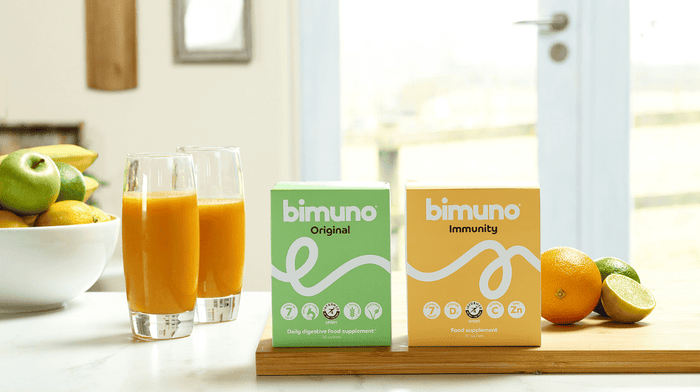
Gut feelings and following your heart may feel closely intertwined as concepts, but as science now tells us this may be more than just about listening to our intuition. Whilst some key risk factors have been identified as playing a role in cardiovascular health such as age, gender and genetics, one that has more recently emerged is our gut health, and specifically, the microbes that live there – collectively known as the gut microbiome.
This is the heart-gut axis, which refers to the reciprocal connection between the gut and our hearts.
Here’s how…
Managing inflammation
Heightened inflammation has been identified as a central part of the development of many cardiovascular conditions. Managing inflammation is a key function of the heart-gut axis, which in part depends on some of the substances produced by our gut microbes, also known as “metabolites”.
When it comes to metabolites, some are beneficial for our health and others less so. Certain metabolites that are less beneficial for our health are linked to various conditions such as heart disease, diabetes and obesity.
On the other hand, short-chain fatty acids (SCFAs) are beneficial substances produced by our gut microbes that could help to support cardiovascular health and manage inflammation. Therefore, through the production of certain metabolites, our gut microbiome helps to maintain a healthy inflammatory response which could have an impact on cardiovascular health.
Supporting metabolic health
There are a few ways in which our gut health can impact our metabolic health. Research shows us that the composition of our gut microbes may have a significant role in maintaining our metabolic health as they could influence blood sugar regulation. In fact, studies show that there are distinct differences in the composition and functioning of the gut microbiome in conditions such as obesity and type 2 diabetes, which are commonly associated with cardiovascular disease.

The gut barrier also plays an important role in regulating the passage of substances, such as nutrients, into our system. When this becomes compromised, unwanted substance can pass the barrier and enter the bloodstream, such as those which can contribute towards inflammation. Like with cardiovascular conditions, inflammation has also been associated with various metabolic conditions.
Maintaining healthy cholesterol levels
Looking after our cholesterol levels is key to maintaining good cardiovascular health. Research suggests that metabolites produced by our gut microbes, such as SCFAs, can play an important role in regulating and maintaining healthy cholesterol levels. Furthermore, a healthy gut is essential for bowel regularity, and including an adequate amount of fibre in the diet can not only support an optimal composition of gut microbes but also, can ensure cholesterol is efficiently removed from the body by ensuring regular pooping.
Heart-healthy support – how to improve gut health
Fuel with fibre

Aim for 30+ plants per week as this has been shown to support a more diverse gut microbiome, whilst also providing fibre and polyphenols, which are an excellent food source for our gut microbes. Moreover, fibre helps to promote healthier poop which can support healthy cholesterol levels. Why not start your day with my gingerbread porridge with toasted seeds and mixed berries which is packed with fibre and polyphenols. Try it here.
Include prebiotics

As these can feed our gut microbes and therefore, help to increase the production of beneficial substances that could influence cardiovascular health. Foods containing prebiotic fibre include chicory, garlic, onions, leeks, asparagus, pistachios, oats and scientifically proven supplements such as Bimuno. My Lemony white bean and greens broth recipe features myriad prebiotics, you can try it here.
Enrich the gut microbiome
Fermented foods such as live natural yogurt, hard cheeses, sauerkraut, kimchi and miso contain beneficial 'probiotic' organisms. These organisms can have a positive impact on the composition of the gut microbiome and support overall gut health.
Support the gut barrier
Eating collagen-rich foods such as bone broth as well as those high in vitamin C such as berries, kiwis, broccoli, rocket, avocados and all types of peppers could support the skin, regular pooping and maintain our immune systems.
Engage in mindful practices

Activities such as yoga, meditation and simple breathing exercises can have a positive influence on both the gut microbiome and the cardiovascular system by alleviating stress and tension. Other relaxing activities such as cooking can help to manage stress, especially with my Tahini choc-chip banana bread recipe here. If you like these recipes, we have plenty more recipes for you to explore to support gut health and aid healthy digestion. Dig in here.
Pasini E, Aquilani R, Testa C, Baiardi P, Angioletti S, Boschi F, Verri M, Dioguardi F. Pathogenic Gut Flora in Patients With Chronic Heart Failure. JACC Heart Fail. 2016 Mar;4(3):220-7. doi: 10.1016/j.jchf.2015.10.009. Epub 2015 Dec 9. PMID: 26682791.
Sandek A, Bauditz J, Swidsinski A, Buhner S, Weber-Eibel J, von Haehling S, Schroedl W, Karhausen T, Doehner W, Rauchhaus M, Poole-Wilson P, Volk HD, Lochs H, Anker SD. Altered intestinal function in patients with chronic heart failure. J Am Coll Cardiol. 2007 Oct 16;50(16):1561-9. doi: 10.1016/j.jacc.2007.07.016. Epub 2007 Oct 1. PMID: 17936155.
Heianza Y, Ma W, Manson JE, Rexrode KM, Qi L. Gut Microbiota Metabolites and Risk of Major Adverse Cardiovascular Disease Events and Death: A Systematic Review and Meta-Analysis of Prospective Studies. J Am Heart Assoc. 2017 Jun 29;6(7):e004947. doi: 10.1161/JAHA.116.004947. PMID: 28663251; PMCID: PMC5586261.
Cani PD, Amar J, Iglesias MA, Poggi M, Knauf C, Bastelica D, Neyrinck AM, Fava F, Tuohy KM, Chabo C, Waget A, Delmée E, Cousin B, Sulpice T, Chamontin B, Ferrières J, Tanti JF, Gibson GR, Casteilla L, Delzenne NM, Alessi MC, Burcelin R. Metabolic endotoxemia initiates obesity and insulin resistance. Diabetes. 2007 Jul;56(7):1761-72. doi: 10.2337/db06-1491. Epub 2007 Apr 24. PMID: 17456850.
Neves AL, Coelho J, Couto L, Leite-Moreira A, Roncon-Albuquerque R Jr. Metabolic endotoxemia: a molecular link between obesity and cardiovascular risk. J Mol Endocrinol. 2013 Sep 11;51(2):R51-64. doi: 10.1530/JME-13-0079. PMID: 23943858.
Marques FZ, Mackay CR, Kaye DM. Beyond gut feelings: how the gut microbiota regulates blood pressure. Nat Rev Cardiol. 2018 Jan;15(1):20-32. doi: 10.1038/nrcardio.2017.120. Epub 2017 Aug 24. PMID: 28836619.
Threapleton DE, Greenwood DC, Evans CE, Cleghorn CL, Nykjaer C, Woodhead C, Cade JE, Gale CP, Burley VJ. Dietary fibre intake and risk of cardiovascular disease: systematic review and meta-analysis. BMJ. 2013 Dec 19;347:f6879. doi: 10.1136/bmj.f6879. PMID: 24355537; PMCID: PMC3898422.
Majumder S, Kiritkumar Makwana R, Shetty V, Mukherjee S, Narayan P. Cardiovascular diseases and the heart-gut cross talk. Indian Heart J. 2023 Dec 7:S0019-4832(23)00472-8. doi: 10.1016/j.ihj.2023.12.003. Epub ahead of print. PMID: 38070671.
Leeuwendaal NK, Stanton C, O’Toole PW, Beresford TP. Fermented Foods, Health and the Gut Microbiome. Nutrients. 2022 Apr 6;14(7):1527. doi: 10.3390/nu14071527. PMID: 35406140; PMCID: PMC9003261.
Khoshbin K, Camilleri M. Effects of dietary components on intestinal permeability in health and disease. Am J Physiol Gastrointest Liver Physiol. 2020 Nov 1;319(5):G589-G608. doi: 10.1152/ajpgi.00245.2020. Epub 2020 Sep 9. PMID: 32902315; PMCID: PMC8087346.
Koike MK, Cardoso R. Meditation can produce beneficial effects to prevent cardiovascular disease. Horm Mol Biol Clin Investig. 2014 Jun;18(3):137-43. doi: 10.1515/hmbci-2013-0056. PMID: 25390009.
Househam AM, Peterson CT, Mills PJ, Chopra D. The Effects of Stress and Meditation on the Immune System, Human Microbiota, and Epigenetics. Adv Mind Body Med. 2017 Fall;31(4):10-25. PMID: 29306937.

Related Articles








